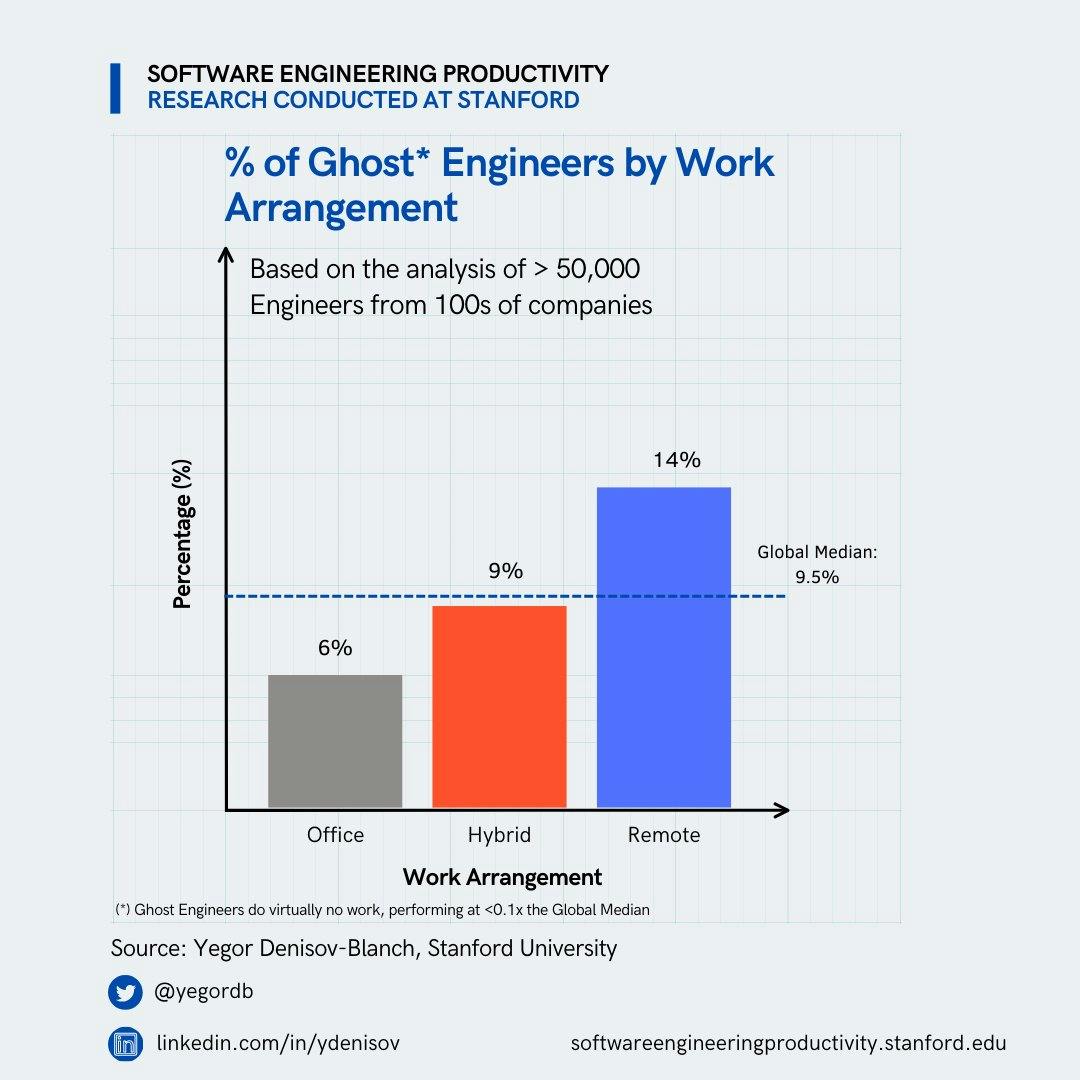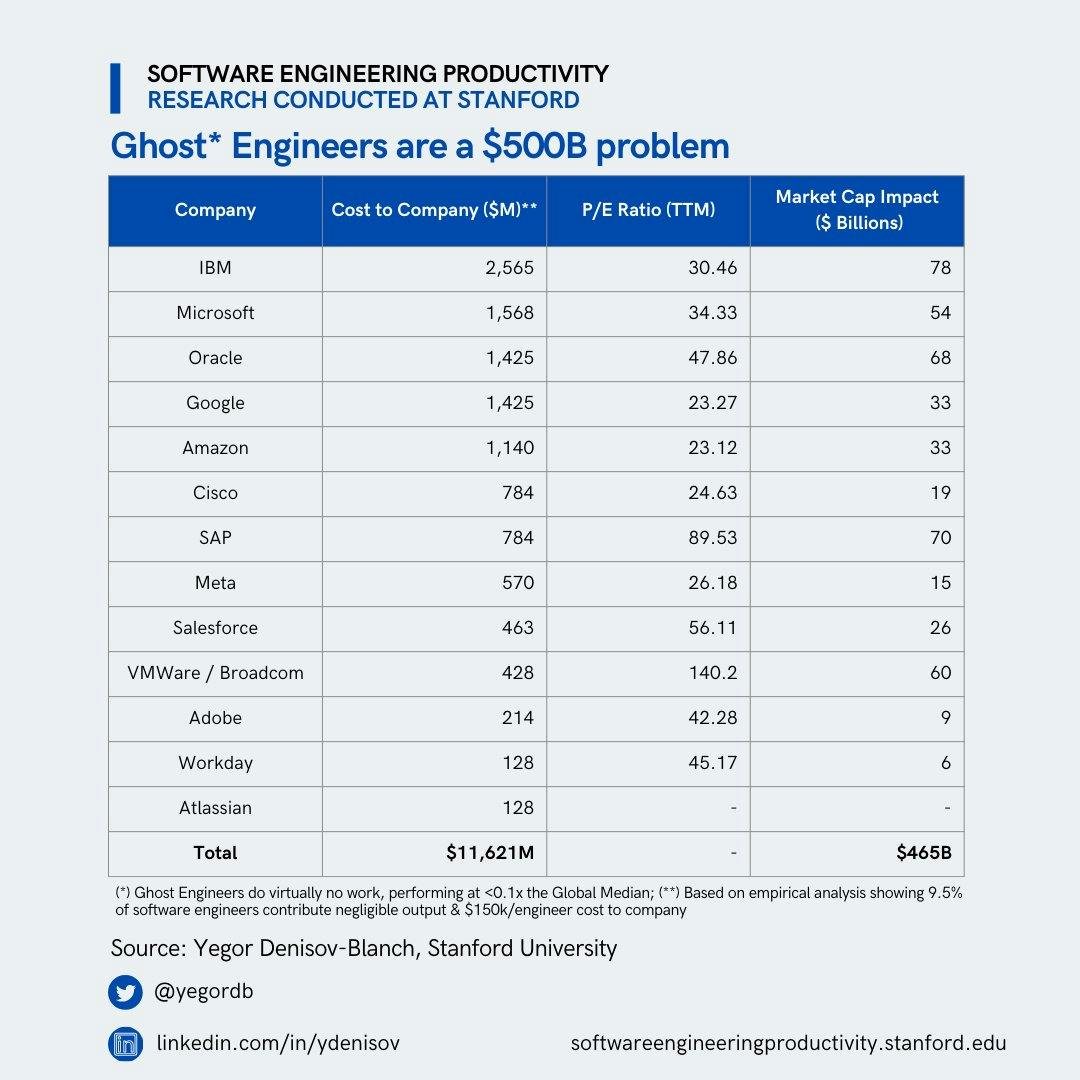Who's writing the code? Turns out 9.5% of software engineers do literally
nothing.
A new study reveals that a surprising number of software engineers are ghosting their teams — and getting paid for it.

A new study from Stanford is shaking up the tech world: 9.5% of software engineers are essentially doing nothing.
They’re being called “Ghost Engineers,” and they’re quietly collecting paychecks while contributing little to their teams or companies. It’s the kind of finding that makes you stop and think — how does something like this even happen?
The researchers analyzed data from over 50K engineers across hundreds of companies. Using private Git repositories, they developed a model to evaluate productivity by simulating a panel of ten experts going through every commit, line of code, and tweak, judging them across multiple dimensions. The numbers speak for themselves, and they aren’t pretty.

Around 14% of remote engineers fall into the Ghost category, compared to 9% of hybrid workers and 6% of those working from the office. That’s a huge gap, and it’s sparking debates about how remote work might impact productivity. However, the most productive ones — the ones producing 5X outputs — are mostly working remotely. Huh?
But productivity issues aren’t just about where people work. More than half of all engineers make fewer than three commits a month. And a lot of those? Super minor edits, like tweaking one line of code. It’s not just slacking — it’s practically clocking in for a nap.
The cost? Astronomical. Inspired by a viral tweet from @deedydas, the researchers estimated how much companies could save if they cut the Ghost Engineers loose. For just 12 top companies mentioned by Deedy, the savings could hit $465 billion a year. Yeah, billion. That’s even without even touching performance metrics. Globally? Even a lowball estimate (6.5% instead of 9.5%) puts the waste at $90 billion annually. Let that sink in.
And the cost isn’t just about dollars. Teams are paying for it in delays, burnout, and frustration. Projects stall. Morale tanks. And those jobs? They could go to people who actually want to work and innovate. Instead, companies are footing the bill for dead weight.
The researchers aren’t just pointing fingers, though. They’re offering a way forward. They’re inviting companies to join the next phase of their study and giving them free access to their productivity analysis platform. It’s a chance to figure out what’s really going wrong, find the bottlenecks, and fix them. For companies, it’s a golden opportunity to shake things up and make real changes.

At the core of all this is a bigger question: Why is this happening? Is it bad management? Growing pains from scaling too fast? A culture issue? Whatever it is, companies need to take a hard look at how they’re measuring performance and holding people accountable.
This study is more than just a reality check — it’s a call to action. Trimming the fat doesn’t just save money; it clears the way for the real MVPs to shine. In an industry built on pushing boundaries, there’s no room for ghosts. The only question now is, will tech step up or keep coasting?

9.5% of software engineers are indie hackers working on their side hustle while they're at their main job 🙈
Everytime I have seen a company "trim the fat" they realize afterwards that those "useless" people were doing a lot of invisible work that kept the business running. But congrats on the short term savings in salary.
这篇文章是行政部门写的
Seems like a marketing gimmic on the researching company part, as judging an engineer by how many lines of code they write is never accurate.
There so many things that has to get done that will never show in a git log, but are way important then code written.
With that being said, there are probably engineers that are just slacking all the time, but those can probably be spotted by managment, or co-workers very easily.
"Using private Git repositories, they developed a model to evaluate productivity by simulating a panel of ten experts going through every commit"
What does that even mean? I still have no idea how they came up with those numbers.
I'll echo @patio11's commentary:
some (probably small %) of engineers do activities that are much higher leverage than coding. e.g. coaching junior engineers, having taste on which technology/tools to use, understanding performance tradeoffs, etc. the cost for making a wrong engineering decision could be anywhere from 5-figures to 7-figures, but you'll never see it at the bill because an engineer prevented that from happening
most engineers are not the above. they're probably overestimating their skill and impact
not all impact is measured in LOCs -- but it's a directionally useful metric that i've used to compare myself to peers.
Brings me back to my couple years of work as a full-time software engineer. I definitely phoned it in a few days a month.
It's uniquely easy to do that as a coder. Kind of goes back to the double-edged sword of knowledge work, which Peter Drucker laid out back in the mid 1900s: you have to give knowledge workers autonomy (low micromanagement) to do their work well, but that very same autonomy can bite you in the ass if they abuse it.
I feel like some engineers make changes that is just a few lines, but are so critical to infrastructure.
There are always people who want to avoid work and look for shortcuts, especially if they don't like their job. Sometimes, it's just laziness.
I’m a newbie dev. I’m running all kinds of prototypes, innovations, and git commits on projects that don’t exist to the public yet. This makes me disgusted with how capitalism works. This is by far the most unnerving article I have read as someone who is obsessed with innovation. If it is true, it means that appointed executives in leadership roles have no idea what they are talking about when it comes to tech. I hate that.
This number I think would be greater than 9.5%, as I personally know in my circle a lot of folks who do this. But there would be an influx of work at a particular period, but most of the time, it is almost nothing.
Is this possibly cost of cultural change? As you go from a startup culture to big corporate culture, it creates a lot of room for the dead weight to hide. With that reasoning this would be true for most corporates (and probably is) not just tech giants.
So, there is no actual source where we can check those stats make any sense? Well, it's definitely a super efficient PR move for their "productivity analysis platform".
I can only be excited by such idea..
Personally I think this is bad management, and a lack of passion. I see this a lot at the company I work out. The work that is produced is not high quality and takes forever to get small features/bug fixes done. Luckily my team has two devs and a manager who all have side projects, and are passionate about technology. The only issue is that upper management blocks us on doing simple features, which lowers our workloads quite a bit.